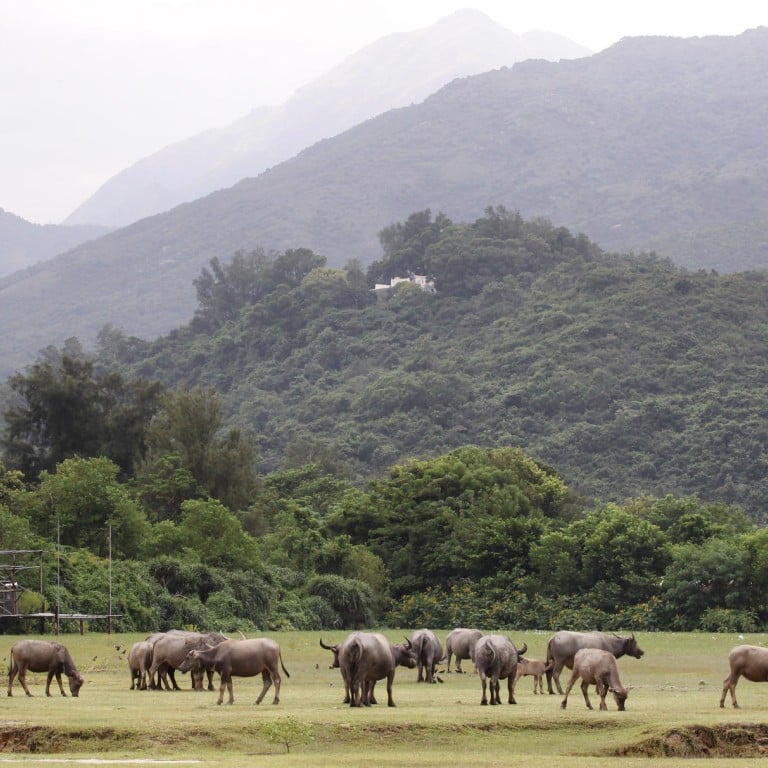
East Lantau Metropolis seems like 'flight of fancy' to some
Property experts question the feasibility of the east Lantau business district project announced by C.Y. Leung
The East Lantau Metropolis project unveiled by Chief Executive Leung Chun-ying last month has ignited the imagination of the island's residents, with some saying it could turn into a new business district focusing on tourism, meetings, incentives, conferences and exhibitions.
However, some property experts say the plan looks unrealistic and more a flight of fancy.
"If this is just a target for the city's long-term development in the next 30 years, I will support it," said Kim Chan Kim-on, a fellow at the Hong Kong Institute of Planners. "But if the government plans to allocate resources to push such a big project forward in the next few years, it is too risky."
Leung unveiled the plan to develop the metropolis on an artificial island in his second policy address on January 15.
He said the government was exploring ways to "further develop the eastern waters off Lantau Island and neighbouring areas, with a view to developing an East Lantau Metropolis".
He said the aim was to turn Lantau into "a core business district in addition to Central and Kowloon East".
Leung also said the government had carried out a preliminary review of the supporting infrastructure needed in order to explore the feasibility of developing a complex offering shopping, dining, entertainment and hotel facilities at the gateway to the Hong Kong-Zhuhai-Macau bridge.
The bridge is expected to be completed in 2016.
The grand project was immediately applauded by the Lantau Development Alliance, which said it would help further develop the island.
But is it feasible?
"From a planner's perspective, the smart principle is to use existing resources to optimise returns," Chan said. "There are still land sites ready for development, but the government thinks of massive land reclamation to develop a new district on an island."
Developing a business district would take a lot of time, capital and human resources, he said.
"You can't just put some hardware on the island and call it a business district. How to attract investors and how to draw talent to work there? A lot of facilities should be made ready first, such as transportation," he said.
Chan also questioned the urgency of developing a third business district, when the second - in Kowloon East - was not yet a reality.
James McLean, an executive director of office services at CBRE, said it would take a very long time before Lantau became a third business district in addition to Kowloon East and Central.
McLean said the idea of developing Kowloon East as a second business district was first raised at the end of 1990s. "But what do you see? Nothing. It is still on the drawing board," he said.
But there are some things that the government could consider, according to Helen Mak Hoi-lun, a senior director of retail services at property consultancy Colliers International, who advises looking at theme parks and retail development.
Mak said that given Lantau's natural attractions and beaches, building a theme park with resort and retail facilities like Singapore's Resort World Sentosa - an integrated project with theme parks, hotels, spas, a casino and meeting and incentive venues - would attract tourists and local residents.
"With a resort, it will retain tourists overnight through selling a package of four days and three nights," she said. "Hong Kong's Ocean Park is recognised as [one of] the world's best theme parks. And safety is an amusement park's top priority. Mainland tourists will have confidence in our theme park rides."
Mak said most mainlanders visited the city by crossing the Shenzhen border, and the number would grow when high-speed trains started running on the Guangzhou-Shenzhen-Hong Kong express rail link, which is scheduled for completion next year.
"Will they travel to Tung Chung? Or just shop in Hong Kong's traditional tourist belt such as Tsim Sha Tsui, Mong Kok and the northern New Territories? We need to study more to avoid making mistakes," she said.
Secretary for Commerce and Economic Development Greg So Kam-leung said last week that Hong Kong could attract 70 million tourists a year within three years and 100 million a year by 2023.
"Some of my clients once asked what goods, particular luxury products, they could buy in Hong Kong that they couldn't in [mainland] China," Mak said. "They found shopping in Hong Kong is the same as in many mainland cities.
"But they do enjoy visiting Ocean Park, Disneyland and our good food."


